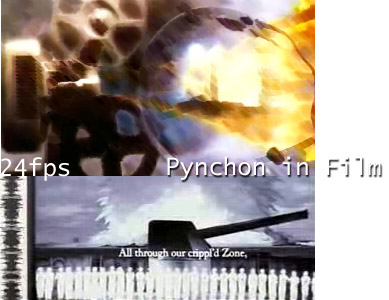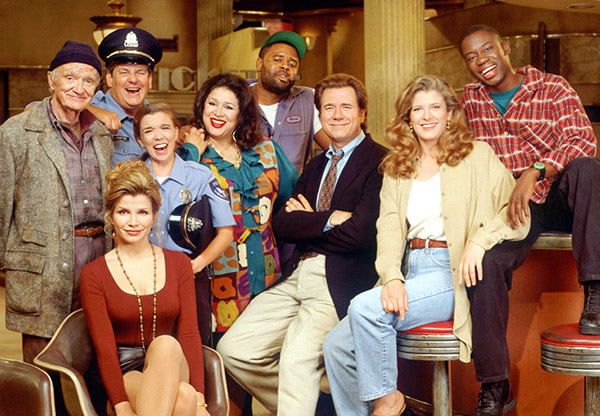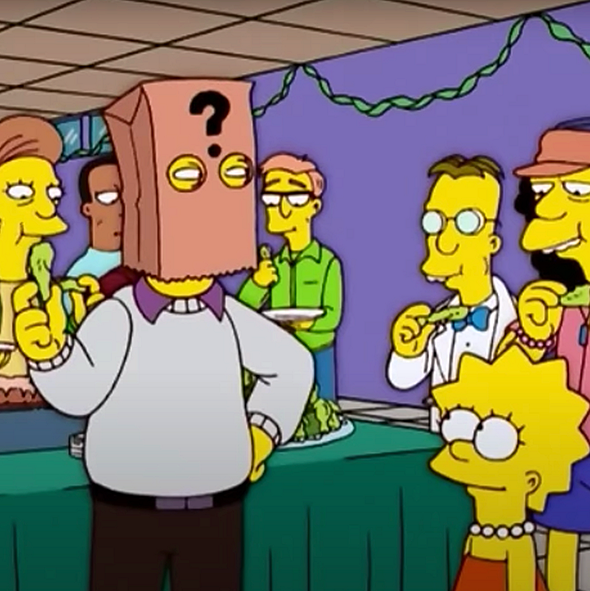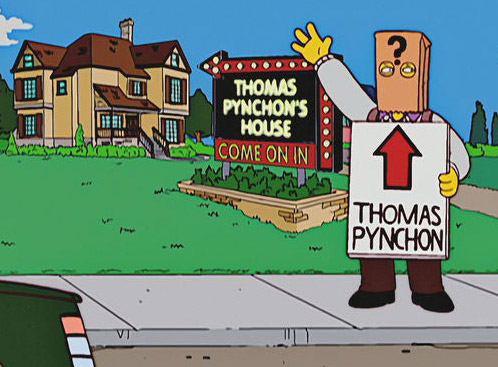Pynchon References on TV

Hark, the herald angels sing:
Mrs. Simpson’s pinched our King…
—Song from “Gravity’s Rainbow”
Pynchon References on Television
This section of Spermatikos Logos collects Pynchon references and allusions culled from American television.
Jeopardy (7 December 1993)
One of the “questions” to an “answer” on the 7 December 1993 TV game show Jeopardy was “Who is Thomas Pynchon.” That would have confused Sean Connery and Burt Reynolds, surely!

The John Larroquette Show (1994)
On NBC for three seasons from 1993-1996, The John Larroquette Show began as an edgy, slightly dark comedy with a sharp cast of characters and a generally intellectual tone. Larroquette—the deliciously sleazy lawyer from Night Court—played a recovering alcoholic and writer named John Hemingway. Forced to manage a run-down bus station in St. Louis, Hemingway continued to pursue his writing aspirations amidst a cast of eccentrics and social misfits, all the while coming to terms with his previous days as an alcoholic. Themes included racism, substance abuse, corruption, and sexuality; unfortunately, the network demanded increasingly more compromises, and the show was essentially neutered by its final season.
Although there were many factors that elevated the writing on The John Larroquette Show well above average, one of them was the literary tendencies of Larroquette himself, an avowed fan of writers such as Thomas Pynchon, Samuel Beckett, and William Faulkner. The show made several passing references to Pynchon, but the most specifically “Pynchonian” episode was Episode 11, airing in 1994 and titled “Newcomer.” Guest-starring David Crosby, the plot had Hemingway’s new girlfriend joining Alcoholics Anonymous and swearing off sex for six months. At one point, reference was made to a “Pynchon sighting,” describing the reclusive author as wearing a Roky Erickson T-shirt; at another point, a character quotes Roger Mexico from Gravity’s Rainbow. New York magazine’s Nancy Jo Sales describes Don Reo, head writer for the show, attempting to gain approval from Pynchon for the script, which originally placed the writer in a Willy DeVille shirt:
I got a call from Pynchon’s agent saying Pynchon liked the script, but he wanted a couple of changes. First you call him Tom, and no one ever calls him Tom. Second, although he likes Willy DeVille he would prefer if it were a T-shirt with Roky Erickson of the 13th Floor Elevators.
Locus (April 1994) reported a further provision that Pynchon not be represented on screen in any way, as originally the script called for the back of an extra to be filmed walking away. Some further notes on this by Richard Lane:
Willy DeVille was leader of Mink DeVille, New York based band first featured on the infamous 1976 Live at CBGB’s album, that didn’t feature ANY CB’s bands you wanted to hear—Television, Talking Heads, Ramones, etc. Their most well known song “Spanish Stroll” may stir a memory. DeVille had moved to New Orleans in the Eighties, and had made a tribute album to New Orleans 50’s R&B. Larroquette is an extremely vocal New Orleans native and supporter, and DeVille’s link with Dr. John, another Larroquette name-check, may provide the reference.
Roky Erickson in 1964 founded The Spades under the name Emile Schwartze. In 1965 the seventeen year old joined Austin’s 13th Floor Elevators, creating a relatively obscure pinnacle of psychedelic music. Stephan P. Brown, publisher of the great Science Fiction Eye magazine, told me that at one time Janis Joplin had a choice between joining the biggest act in Texas, the Elevators; or an unknown band in San Francisco. In 1969 Erickson, a prodigious drug taker, faced with jail time for a number of marijuana arrests, copped an insanity plea, and was sent to the Texas Hospital for the Insane. There, three years of licensed drug experiments, electric shock treatments, and hundreds of past acid trips combined to produce a truly damaged individual. Roky has since released a number of solo records, had his lyrics published by admirer Henry Rollins, and an early book of poetry under the name Rev. Roger Roky Kynard Erickson. He still lives in Austin, still mentally and financially troubled. A tribute compilation of covers called Where the Pyramid Meets the Eye featured R.E.M. and ZZ Top. Melanie Jackson’s proviso—that Pynchon not be referred to as Tom—is odd, since Pynchon himself signed letters that way, his mother called him Tom Jr, and former publisher and friend Michael Naumann calls him Tom.
There are a few other Pynchon-notable moments in the show. In one episode, Hemingway tries to distract his love interest in his apartment by thrusting a first edition copy of Gravity’s Rainbow into her hand. She replies “Wow,” and is apparently so stunned by the book that Larroquette successfully achieves his comedic goals. When Hemingway’s long-lost hippie daughter (played by “Blossom” star Mayim Bialik) turns up, he discovers she’s been using the name Rachel Owlglass. He asks her, “Do you know there’s a Thomas Pynchon character named that?” To which she replies, “Yes, I know, from V., I chose it myself.” On another episode, an author whom Hemingway ranks as a favorite “next to Thomas Pynchon” turns out to be unworthy of his idolatry.
Pearl (1996-97)
Although it ran for only one season, Pearl was a fairly witty show featuring Rhea Pearlman as a sharp, blue-collar mother attending college with students half her age. The show’s main thrust came from the tension experienced between her character—Mrs. Pearl Caraldo—and a particularly acerbic, intelligent, and elitist literature professor played to the hilt by a snowy-haired Malcolm McDowell. The name of the tyrannical professor? Stephen Pynchon. The fact that Pearl was the next show produced by Paul Junger Witt, the executive producer of The John Larroquette Show, indicates this might be more than just a coincidence.
Deep Space Nine (1997)
According to Dave Monroe of the Pynchon List, a Season Five episode of Star Trek: Deep Space Nine might be a loose parody of Pynchon’s The Crying of Lot 49. Airing on June 9, 1997, Episode 523 bears the title “In the Cards,” and details the efforts of the Captain’s son, Jake, in acquiring a rare baseball trading card—part of a collection up for auction and labelled “lot 49.” The following synopsis is from Psi Phi:
As the Dominion threat to the Alpha Quadrant intensifies, Jake notices Sisko is growing increasingly depressed. Hearing that Quark plans to auction off a collection of antiquities that includes a vintage Willie Mays baseball card, he decides obtaining the card for his father is the perfect way to lift his spirits. Jake persuades Nog to use his life savings to bid on the collection, but a man named Dr. Geiger outbids them, taking the card and crushing Jake’s hopes.
Jake and Nog approach Dr. Geiger with an offer to buy the card, but he refuses. However, after researching their backgrounds, Geiger offers to trade them the card for various pieces of equipment and medical supplies. Upon Nog’s insistence, Geiger reveals he needs the items to develop a machine that will deliver eternal life by “entertaining” cells – preventing them from dying of boredom. Jake’s determination to get the cards leads them to agree to Geiger’s terms.
Meanwhile, Kai Winn meets with Dominion representative Weyoun on the station to discuss the Dominion’s wish to sign a non-aggression treaty with Bajor. Sisko feels strongly that this would be an unwise move and convinces Winn to stall the proceedings. Later, Jake and Nog return to Geiger’s quarters with the last of the items he requested, only to find that Geiger and his equipment are gone.
After learning that Odo has no record of Geiger being on the station, Jake and Nog spot Kai Winn on the Promenade, talking with a man who bid against them at the auction. Jake assumes they kidnapped Geiger and confronts Kai. This lands him and Nog in Sisko’s office where, determined to keep the baseball card a secret, Jake tells his father they were drunk. Sisko confines them to quarters, but on their way they are suddenly transported to a Jem’Hadar interrogation room.
Jake and Nog explain their quest to obtain the baseball card from Geiger, who is being held captive, but Weyoun believes they are plotting against him. Desperate, Jake makes up a story about working for Starfleet Intelligence. The tale is so preposterous Weyoun decides he believes the first story. In fact, he is actually interested in Geiger’s work! Weyoun lets the boys take the baseball card, which, as Jake predicted, succeeds in improving his father’s mood.
Although the plot bears a few other similarities to Pynchon’s The Crying of Lot 49—a mysterious central figure, a shadowy “conspiracy,” a sought-after rare collectible—Thomas Pynchon is not listed anywhere in the official credits, and the connection could be entirely coincidental, despite the “lot 49” reference itself. The Pynchon List’s Joseph Bono concurs with this, but points out a few more Pynchonian similarities:
There’s no indication in the production notes that Truly Barr Clark, Scott J. Neal, or Ron Moore based the episode in any way on The Crying of Lot 49, or that they are even aware of Pynchon, but nevertheless the episode does have a number of Pynchonian elements.
The Willie Mays baseball card that Jake and Nog work to obtain throughout the episode is a MacGuffin, it doesn’t have any particular powers or represent a link to a deep conspiracy. But it does spawn a brief, virtual conspiracy when Jake and Nog provide Weyoun with a whopper of a cover up story, that:
“Until yesterday, that man, one Willie Mays, did not exist in any historical documents. Then, in a blink of an eye, that card appeared on the station. And at same moment a bust of Willie Mays appeared at the Hall of Fame in Cooperstown, New York. There’s only one explanation: we suspect that this man is from the future. […] And so far, that card is the only link we have to him. We must find out what he has done in the past, or what he may have done already. We need that card. The entire future of the galaxy may depend on tracking down Willie Mays and stopping him.”
I believe the secret underground network of communications Joe refers to is the series of machinations Nog goes through to provide Dr. Geiger with the supplies he needs in trade for the Willie Mays baseball card. Again, it seems like a surface similarity, as these are not particularly pre-existing networks, nor do they have a mysterious “other” quality. Dr. Geiger, however, seems to be a very Pynchonian character – he’s quite paranoid, delusional, and fleeing from the “Soulless minions of Orthodoxy.” Oh, and his invention? “The Cellular Regeneration and Entertainment Chamber” which he designed to alleviate “cellular ennui.” You see, you die not because your body decays, or evolved to reach a certain lifespan, but because your cells get bored. But if you relieve their boredom, if you keep them constantly entertained, you can live forever. Geiger’s name stems from a bad, Pynchonesque pun/joke – “Lions, and Geiger’s, and bears . . . Oh my!” (reference: ST:DS9 Companion), and has few fantastic lines:
“I haven’t broken any laws, except perhaps the laws of nature.”
“What does it do? [Bunch of technobable]…and send uplifting and entertaining messages to the nuclei of every cell in your body. Spend eight hours a day in this machine, and your cells will never get bored, you will never get old, and most important, you will never die!”
“I’m not crazy—I’m just a little obsessed”
I don’t think it is meant to be a Pynchon parody. Rather, the series hit upon a particularly deranged and absurd character, who provides us with moments of Pynchonesque dialogue.
In this case, feel free to file this entry under the “Smells Like Teen Spirit Department of Over-Reaching.” But still, Weyoun is played by the eternally creepy Jeffrey Combs, star of The Reanimator, and we all know how trustworthy he is; and there was one episode of Star Trek: The Next Generation that ripped off Anne Rice’s The Witching Hour with nary a nod of credit, so….
Futurama (1999)
To a certain set of television connoisseurs, Matt Groening’s Futurama was one of the greatest shows to ever grace the airwaves. But to the idiots at Fox Network, it was just the bastard stepchild of The Simpsons, and they did everything they could to make sure Futurama could never be seen at a reasonable time slot. After setting their phasers to “Fail,” the network finally succeeded in their evil schemes, and Futurama was zapped into the “brilliant but cancelled” zone. (Edit: Until it was resurrected! Then zapped again.)
Happily, there are the box sets, which contain commentary for each and every episode in the first two seasons. Epitomizing the best that television commentary can offer, the viewer is treated to Matt Groening and half the show’s creative staff, apparently sitting around a TV and pointing out all the allusions, in-jokes, and animation difficulties as they bust of each other and make fun of Fox. Many things are revealed by the commentary, including numerous sci-fi references hidden in the show, from a Dungeons & Dragons “Rust Monster” to one of Lovecraft’s Yithians used as a space bride. Thomas Pynchon makes an “appearance” in two episodes:
Season 1
In the commentary track for an episode of season one, the show’s creators briefly discuss what books they’ve never finished, and Matt Groening admits to something that we’ve all heard from our friends: “I never read Gravity’s Rainbow.”
Season 2, Episode 7: “A Head in the Polls.” Aired December 12, 1999.
“A Head in the Polls” begins with a Twilight Zone parody of the classic episode in which a voracious reader, the sole survivor of Armageddon, finds himself alone in a library—only to break his eyeglasses! In the Futurama version, the poor reader’s luck is even worse. After breaking his glasses, he proclaims that he can still read large print: and his eyeballs pop out. But he still has Braille!—until his hands fall off. He screams, and his tongue falls out, finally followed by his head dropping off.
Among the books seen on the shelves of the future library are 2084 and Anti-Gravity’s Rainbow; which I bet Groening’s never read, either.
Angel (14 January 2004)
About a tortured vampire who fights even darker forces, the Buffy spin-off Angel is set in a surreal Los Angeles haunted by demons and other supernatural creatures. It is also the home of Wolfram & Hart, a globe-spanning law firm with evil intentions. These aren’t just your average evil lawyers, mind you, but actual warlocks and demon-worshippers, always looking to climb the ladder of power one back-stab at a time. As the series progressed, Wolfram & Hart become a bigger obstacle to Angel’s plans, until he finally defeated the bad guys (worse guys?) and brought the firm under his nominal control. In episode 5ADH09, “Harm’s Way,” it is revealed that among Wolfram & Hart’s previous contacts—evil contacts—is that nefarious company, Yoyodyne. While it’s possible the writers intended Yoyodyne as an allusion to Buckaroo Banzai, the name itself originates in Pynchon’s oeuvre as a sort of sinister version of Boeing. But whether hatching conspiracies in San Narcisco or sending Red Lectroids into the 8th Dimension, it comes as no surprise to find that they are represented by a coven of Satanic lawyers.
The Simpsons (2002, 2004)
Season 13
We always knew that Gravity’s Rainbow is an acid test for hip intellectual snobbery, so it was only a matter of time before Lisa Simpson found herself measured and found wanting. In Season 13 of The Simpsons, Pynchon gets referenced in an episode called “Little Girl in the Big Ten,” airing 12 May 2002. Lisa is happy to discover that she can pass for a greatly accelerated college student, and spends quite a lot of time being dazzled by the intellectualism of campus life, from taking in a Pinsky reading (“The Coletrane of the quatrain”) to spying an “average” girl’s reading material—a copy of Gravity’s Rainbow sitting on her locker-room bench:
Lisa Simpson (in awe): “Are you reading Gravity’s Rainbow?”
College Girl (snidely): “Well, re-reading.”
Season 15
Well, here’s the big one. For years, Pynchon avoided being photographed, declined interviews, and never spoke in public. So where does he decide to let the public first hear his voice? The Simpsons, of course.
Airing January 25, 2004, episode FABF05 is titled “The Harpooned Heart,” and deals with Marge’s transformation into a novelist. More than just revealing Pynchon’s voice, we finally find out the name of that sailboat painting hanging over the Simpsons’ protean couch: A SCENE FROM MOBY-DICK.
Finding this an impromptu inspiration, Marge writes her first novel, The Harpooned Heart, a tale about Nantucket whaling wife Temperance Sparrow and her husband, the wretched Captain Mordecai. Feeling unloved by her salty spouse, and no-doubt unfulfilled by her he’s-at-home, Temperance falls for Cyrus, the sexy neighbor down the street. In the end, both men are dragged to their death after Captain Mordecai harpoons his rival through the heart, inadvertently attaching them both to a sounding leviathan.
After praising her manuscript, her publisher seeks blurbs from Thomas Pynchon and Tom Clancy. In the
short Pynchon scene, we see the author by the side of the road, his head concealed behind a paper bag bearing a question mark. His house is marked by a sign: “Thomas Pynchon’s House: Come On In!”
Speaking on his cell phone, Pynchon desperately seeks to be noticed by the passing cars:
Pynchon: “Here’s your quote: ‘Thomas Pynchon loved this book, almost as much as he loves cameras.’”
After hanging up, he puts on a placard emblazoned with his name, and shouts to the oblivious traffic:
“Hey, over here! Have your picture taken with a reclusive author. Today only, we’ll throw in a free autograph! But wait—there’s more!
After securing this blurb, the publisher traps Tom Clancy, and the book is published to popular success, despite being critically trounced. Naturally, Marge’s fellow Springfielders read her work as a roman à clef, a chronicle of frustration expressing her dissatisfaction with Homer and confessing a secret passion for Ned Flanders. From this point on, as they say, hilarity ensues.
On August 29, 2003
The Simpsons Executive Producer Al Jean was interviewed by Andy Patrizio for IGN.com, where he first announced that the show had signed Pynchon on board, joining previous
Simpsons alums like Robert Pinsky, George Plimpton, and Jasper Johns. Here’s the relevant information
interview, in which Andy Patrizio clearly demonstrates a lack of understanding of the word “coup.” (But IGN reviews are notorious for poor editing and misusing words, so…)
IGN DVD Editor Andy Patrizio: Where would you like to start, the DVDs or the show?
“Simpsons” executive producer Al Jean: Well, let’s talk about the show. We just completed season 14. Next season will put us ahead of Ozzie and Harriet as the longest running sitcom ever. Coming up in the fall we start as usual with our Halloween show in November. Guest stars include Jerry Lewis who plays the father of Professor Frink, who is loosely modeled on Jerry Lewis’s characters, we also have a show where Homer’s mother returns and is put on trial. We also have a show where The Simpsons go to London and it includes guest voices from Ian McKellen, J.K. Rowling, Jane Leeves and Prime Minister Tony Blair, playing himself. We have a show coming up where Marge writes a novel and gets endorsements from writers playing themselves, including Tom Clancy, Thomas Pynchon—
IGN DVD: How did you get him?
[IGN Editor’s note: For the unfamiliar, Pynchon is the most reclusive and elusive author in the U.S. He never does interviews, has never been photographed, and people don’t even know where he lives. He makes “Calvin & Hobbes” cartoonist Bill Watterson look like a publicity hound.]
Al Jean: We got him. (laughs) He was really nice.
IGN DVD: Oh well of course, he’s not seen, right?
Al Jean: He’s wearing a paper bag over his head, but it is his voice.
IGN DVD: Oh that’s priceless. I hope somebody gets the joke. Actually, I think getting J.K. Rowling is a bigger coup because she is better-known.
Al Jean: Well, she likes the show, we got her by satellite, I think from Scotland, and she’d just had her baby.
Season 16
Thomas Pynchon “appears” a second time on The Simpsons, in episode #337, “All’s Fair in Oven War” which aired on November 14, 2004. The synopsis reads: “After Homer suddenly develops a knack for cooking, he unwittingly competes against Marge in a bake-off.”

Once again wearing the paper bag, Pynchon drops by to try some food:
Lisa Simpson: “What do you think, Thomas Pynchon?”
Pynchon: “Nom nom… These wings are V-licious! I’ll Put this recipe in the Gravity’s Rainbow cookbook, next to the Frying of Latke 49.”
 0
0 



